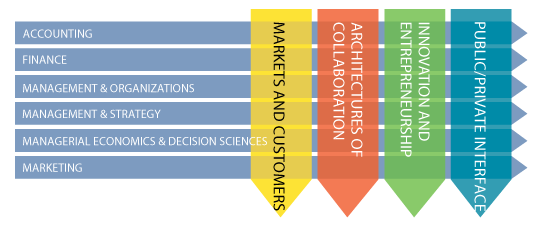| The focus on customers has moved beyond the marketing department to core processes throughout the entire organization. It's a fundamental change. Those who have embraced the change understand customers in ways their competitors do not, creating more value and leading the way forward in their markets.
Gregory Carpenter |
ESTABLISH OUR
THOUGHT LEADERSHIP
To be effective and relevant in the 21st century marketplace, business education must move away from its traditional discipline-based silos. Instead, we must work to create knowledge that crosses boundaries and inspires new conversations and ways of solving problems.
To catalyze this shift at Kellogg, we have developed a model for management education that emphasizes four themes. We've begun to organize our research and teaching around these themes:
Markets and Customers: Anticipating and meeting customers' needs is the ultimate source of value creation in the global, free-market economy — neither markets nor firms create value without doing so. While this is not a new insight, it is one that has profound implications for the Collaboration Economy. The most successful firms will rethink how they organize people, markets, technology, information, budgets and workplace cultures to better understand, engage with, and more nimbly respond to their customers.
| At the end of the day, capabilities outlast markets. They're hard to build, offer significant value and are very difficult to copy when integrated with everything you do. For a leader, they leave a legacy of differentiation and a company that knows what its purpose is. For a business school, there's a real opportunity not just to teach that type of leadership, but to become a model example.
Cesare Mainardi '86, |
Architectures of collaboration:The 21st century leader must catalyze people and resources in more complex configurations, disparate geographies and faster timeframes than ever before feasible. Building successful enterprises will require leaders to facilitate asynchronous teamwork across time zones; manage social contagion, negotiations and conflict resolution across cultures; and deploy the strategic use of communications to unify action. These new "architectures of collaboration" will require new management skills, but also promise unprecedented advances in efficiency, productivity and financial and creativity gains.
Innovation and entrepreneurship: A fundamental challenge for leaders, regardless of the size of their enterprise, is to identify and nurture new ideas — then create the organizational infrastructure and financing to turn those ideas into valuable goods and services. Fostering creativity and systems thinking, taking a portfolio approach to investment and risk, and managing innovation and growth — these skills lie at the heart of economic vitality and organizational resilience.
| There is a real tension between modern businesses and the societies in which they operate. The relationship between business and society is undergoing — and has undergone — tremendous changes… The public expects companies to take on issues and challenges that previously would be considered to be the role of governments or charities.
Daniel Diermeier, |
The Public/Private Interface: A strong legal, regulatory and political infrastructure has always been a cornerstone of successful capitalism. But that infrastructure must evolve to support the changing demands of the global Collaboration Economy and its increasingly diverse social fabric, where business is the dominant social institution. Global business leaders will be called to engage in the development of well-informed public policy and use their influence to drive decisions that strengthen society and protect valued resources — both domestically and abroad. This will require leaders to think clearly about the impact of their organizations on a variety of stakeholders and to address a wide range of social, economic and environmental issues previously considered the sole domain of the public and not-for-profit sectors.
|
new strategic research initiatives: Creating a research structure that drive new dialogues
|
 |


